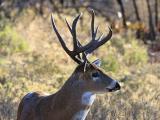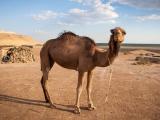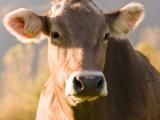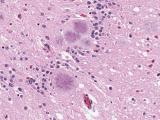Apr 24, 2012 (CIDRAP News) – US agriculture officials today announced that the first US case of bovine spongiform encephalopathy (BSE) since 2006 was found recently in a California dairy cow, but they were quick to add that the case represents no danger to the food supply.
The case was detected through the government's surveillance program for BSE, or mad cow disease, the US Department of Agriculture (USDA) said. The carcass is being held under state authority at a California rendering plant and will be destroyed.
"It was never presented for slaughter for human consumption, so at no time presented a risk to the food supply or human health," USDA Chief Veterinary Officer John Clifford said in a statement.
The case is only the fourth one reported in the United States. The first case was found in a Canadian-born cow in 2003.
BSE is a brain disease of cattle that is always fatal and is believed to be the cause of a similar fatal disease, variant Creutzfeldt-Jakob disease, or vCJD, that can strike people who eat meat from infected cattle. Cattle contract BSE by eating contaminated feed.
However, Clifford said in the statement that the California cow tested positive for "atypical BSE, a very rare form of the disease not generally associated with an animal consuming infected feed."
Atypical BSE differs from classic BSE in that cattle that have it are usually older and generally appear healthy, said Jeff Bender, DVM, an animal health expert at the University of Minnesota in St. Paul.
Bender said he believes the last BSE case in the United States, found in an Alabama cow in 2006, also was an atypical one. There has been no evidence of a link between atypical BSE and human disease, he said.
The emergence of BSE in British cattle in the 1990s led to a series of safeguards to stop the disease, starting with a ban on feeding cattle with protein derived from cattle and other ruminants. After the first US BSE case was found, the USDA banned "specified risk materials"—cattle parts most likely to contain the BSE agent if an animal is infected—from the food supply. "Downer" cattle, those that can't walk when brought to the slaughterhouse, also were banned from the food chain.
"Evidence shows that our systems and safeguards to prevent BSE are working, as are similar actions taken by countries around the world," said Clifford. "In 2011, there were only 29 worldwide cases of BSE, a dramatic decline and 99% reduction since the peak in 1992 of 37,311 cases. This is directly attributable to the impact and effectiveness of feed bans as a primary control measure for the disease."
Clifford said the California case was detected through the USDA's "targeted surveillance system" but did not say whether the cow showed any signs of illness. Testing was done at the USDA's National Veterinary Services Laboratory in Ames, Iowa.
The results are being shared with animal health reference labs in Canada and England that are affiliated with the World Organization for Animal Health (OIE), Clifford said.
"These labs have extensive experience diagnosing atypical BSE and will review our confirmation of this form of the disease," he added. "In addition, we will be conducting a comprehensive epidemiological investigation in conjunction with California animal and public health officials and the FDA."
Clifford asserted that the new case "in no way affects the United States' BSE status as determined by the OIE," because the nation has all the recommended safeguards.
In an online statement posted on YouTube, Clifford said, "This announcement today should not disrupt trade. We follow international guidelines through the OIE, and those international standards are based on safe trade in both animals and animal products. It's our interlocking safeguards that protect both animal health as well as human health."
In a separate statement this afternoon, Agriculture Secretary Tom Vilsack said, "USDA has no reason to believe that any other US animals are currently affected, but we will remain vigilant and committed to the safeguards in place."
Despite the reassurances, cattle futures prices on the Chicago Mercantile Exchange fell after the USDA announcement, Bloomberg News reported.
See also:
Apr 24 USDA statement
Apr 24 USDA press conference on YouTube
Apr 24 Vilsack statement
May 2006 CIDRAP News story on last BSE case in US

















